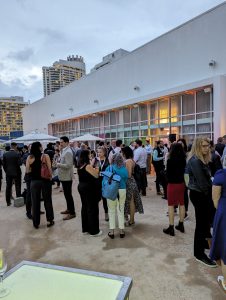
Inside view: A woman dancing on stilts adds to the Mardi Gras atmosphere as Phacilitate celebrates its 20th anniversary.

Outside view: Networking at welcome party, Advanced Therapies Week 2024 in South Beach, Miami, Florida.
When does Mardi Gras come to Miami, Florida? When it’s Advanced Therapies Week (ATW). The industry-focused conference was back at the Miami Convention Centre in South Beach, but possibly for the last time as the conference is moving to San Diego next year. That may have contributed to the party atmosphere, but it probably had more to do with the fact Phacilitate was celebrating its 20th anniversary and prospects for the industry are looking up with dozens of approvals expected this year. The welcome party ramped up the fun with a Mardi Gras theme complete with a dancer on stilts, a live band and a buffet dinner. I didn’t spot any King cake, but maybe I missed it.
That was party number one. For party number two, delegates took to the high seas, or rather Biscayne Bay, for the popular yacht cruise that has been a fixture of ATW since it landed in Miami in 2017. That took place on the second night of the conference.
On the final night of the conference, ATW2024 hosted the Advanced Therapies Awards – for only the second time. This year’s event felt a little more subdued, but the winners were equally deserving. The awards kicked off with a heartfelt speech by Dr. Sven Kili, Chief Development Officer at CCRM, who praised Dr. Luigi Naldini, the winner of the Lifetime Achievement Award. You can watch Dr. Naldini talk about his pioneering work with lentiviral vectors in this video from Phacilitate, and/or hear from him in this podcast by the American Society of Gene and Cell Therapy on the “Giants of Gene Therapy Podcast.”
The rest of the awards portion of the evening saw winners coming on stage to accept awards for “gene therapy biotech innovation,” “patient advocacy,” “manufacturing tech disruptor of the year,” “women in advanced therapies,” and many more categories – a total of 10. You can see the full list of winners here. Congratulations to the winners and also the finalists.
Turning to the daytime activities, the new agenda offered a manageable amount of talks with plenty of time for partnering meetings and visiting the exhibit hall. As I always do, I attended the super plenary fireside chat (January 16) hosted by Anthony Davies, CEO of Dark Horse Consulting, and the opening plenary (January 17). After that, I divided my time between talks on commercializing future therapies and patient considerations. I’m going to save that post for another day. [You can find that post here.]
Fireside chat guests included Pascal Touchon, CEO of Atara Bio, and Michael E. Meyers, Vice Chairman and Head of M&A and Strategic Advisory Services for H.C Wainwright & Co. LLC, who have spoken previously at Advanced Therapies Week, and newcomer – at least to me – Laurie Adami, who was very knowledgeable and surprisingly entertaining when describing her journey as a CAR T patient and patient advocate.
Laurie was 46 when she was diagnosed with stage 4 incurable follicular non-Hodgkin lymphoma. As you can read on the Cancer Research Institute’s page, Laurie turned to CAR T-cell therapy in July 2018, after she had exhausted all other treatment options. She was accepted into a Phase 2 clinical trial of Yescarta at the University of California, Los Angeles (UCLA). She was the first patient at UCLA to enroll in the trial.
CAR T was Laurie’s 7th therapy in 12 years. She had also tried R-CHOP, Vorinostat in a Phase 2 trial, R-Bendamustine; Bexxar RIT, Cal101 (Zydelig/Idelalisib) Phase 1 trial; and obinutuzumab. Although she had complications during her treatment, today she is in remission and cancer-free.
Another fireside guest was Nicole Verdun, Director, Office of Therapeutic Products, CBER, FDA, who was consistent in her messaging that communicating early and often would serve developers well, and also that she’s optimistic about some new programs in place at the FDA that are intended to expedite the regularly approvals process for gene therapies. Here are the programs (borrowed from Cal Strode’s blog on the state of the industry):
- The Support for clinical Trials Advancing Rare disease Therapeutics (START) pilot is looking to identify three eligible products to receive a “concierge service” styled enhanced communication with CBER when selected for the pilot. Applications for requests to participate will be accepted up until March 1, 2024. More information can be found here on gov.
- The Collaboration on Gene Therapies Global (CoGenT Global) pilot is designed to harmonize and potentially pool forces of global regulators to increase the efficiency of the regulatory process, reducing time and cost for agencies and sponsors.
Again this year, Susan Nichols, CEO of Propel Biosciences, shared her top 10 list from 2023 at the opening plenary. The takeaway message was how optimistic she is for 2024. She called it a “ray of sunshine [after] what was looking like a bleak two years.”
Here is the top 10 list from 2023.
Before I discuss #1, #7 may require some context as growing pains could mean many things. In this case, Susan Nichols’ is referring to the news that The FDA published a safety advisory on the risk of T-cell malignancies among individuals receiving autologous chimeric antigen receptor T-cell therapy for the treatment of certain blood cancers. However, Peter Marks, Director, Center for Biologics Evaluation and Research, stated during the Alliance for Regenerative Medicine’s “State of the Industry,” at the J.P. Morgan conference the week prior to ATW2024, that this rate is not overly concerning in this malignancy setting right now.
We all remember the end-of-year approvals in the UK (Casgevy by Vertex and CRISPR Therapeutics) and U.S. (Lyfgenia by bluebird bio) for treatments for sickle cell disease. This exciting news came in at #2 on the list and influenced #1.
Patient access has been a theme dominating cell and gene therapy discussions for several years now. It’s not enough for treatments to be approved if there is inequity in access. At ATW2023, Professor Peter Zandstra, University of British Columbia, shared some thoughts on the topic and I have heard others, like Tom Whitehead, father of CAR T patient Emily Whitehead, speak on the importance of equitable access for patients and his foundation’s efforts to support patients in developing countries who want to access treatments.
Since Susan kindly shared her slides with me, I’m able to share the background behind her reference to global patient access (#1), stemming from the new treatments for sickle cell disease.
If you have your own thoughts on this topic, or the list, please share them in the Comments section below.
Stacey Johnson
Latest posts by Stacey Johnson (see all)
- Right Turn: Top 10 blogs from 2025 - January 9, 2026
- Right Turn: Season’s greetings and upcoming event - December 25, 2025
- Right Turn: Stem cell supplements: A growing market with growing risks - December 19, 2025








Comments